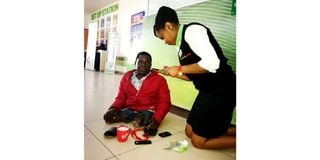Passing of disability law is historic gain to the voiceless and invisible

A Safaricom customer care staff, Ms Pauline Shamola, serves a subscriber in Nakuru on October 25, 2016. With the United Nations Convention on the Rights of Persons with Disabilities being part of Kenya’s law under Article 2(6) of the Constitution, the nation commits to the socio-economic inclusion of PWDs.
What you need to know:
- The push for disability rights in Kenya dates back to the pre-colonial era.
- The 2010 Constitution further strengthened the position of PWDs.
Dr Martin Luther King Jr, speaking of the long journey to establishing equity among all races, said “the arc of the moral universe is long, but it bends towards justice”.
The statement has been used the world over in pushing for social reforms, noting that change isn’t immediate, but gradual. In the disability front within the Kenyan context, it’s been a long time coming as each generation is tasked with putting in the work of making our society and country more disability inclusive.
The push for disability rights in Kenya dates back to the pre-colonial era. In 1964 — the year we became a republic — people marched to Harambee House under the Kenya Union of the Blind, pushing to have the government hear their voices. The march injected a sense of self-knowledge to a society that had long been unmindful of the rights of persons with disabilities (PWDs).
Like lost innocence, this new conscience couldn’t be ignored. Progressively, more players, including presidents, actively contributed to pushing the disability agenda forward — from the establishment of the National Fund for the Disabled of Kenya by President Moi, to the signing into law of the Persons with Disabilities Act, 2003, by President Kibaki.
New registration system
The Persons with Disabilities Act, 2003, brought with it a myriad of benefits, all intent on levelling the playing field for all. To mention a few: Issuance of tax exemption, reservation of five per cent employment to persons with disabilities in public and private entities, assistive devices, educational support and also the establishment of the National Council for Persons with Disabilities .
But more work had to be done. President Kenyatta, then Finance minister, allocated an initial Sh200 million to the council’s development fund established by the Act, which funds activities geared towards improving the socio-economic wellbeing of PWDs. In 2010, the tax exemption policy for PWDs was also implemented, applying to the first Sh150,000 monthly or Sh1.8 million annual incomes of PWDs.
The 2010 Constitution further strengthened the position of PWDs. With the United Nations Convention on the Rights of Persons with Disabilities being part of Kenya’s law under Article 2(6) of the Constitution, Kenya commits to the socio-economic inclusion of PWDs.
Months after taking office in his first term, President Kenyatta launched the Access to Government Procurement Opportunities (Agpo) programme, which allocates 30 per cent of government procurement opportunities to women, youth and persons with disabilities.
As part of the global community, Kenya has participated in myriads of forums, including co-hosting the first ever Global Disability Summit in 2018 with the UK and the International Disability Alliance, where more than 900 commitments were made. One of the commitments made by Kenya was for generation of proper disability disaggregated data, a commitment already on course with the ongoing roll-out of the new registration system.
With the Disability Act being the first in Kenya’s history, it wasn’t intended to be the last. Indeed, the Act, assented prior to 2010, is not in tune with the new Constitution and the changing times. The process of reviewing this law started in 2013, with no successful enactment.
During the International Day of Persons with Disabilities celebrations last December, the President — the first Head of State to attend the occasion — directed all relevant agencies to hasten the review so that Parliament can enact the new law in its current lifetime. As a result, the Bill moved from the Attorney-General’s office to the floor of the House.
Continue improving
Three weeks ago, the period for the public to make submissions came to an end, and the Committee on Labour and Social Welfare is developing a report for onward readings by Parliament.
The draft Bill dictates rights to women, children, youth and senior citizens through aligning it with Article 54 of the Constitution. There are also provisions on safety of PWDs during emergency situations, as well as free disability medical assessments in all public institutions. Again, the Bill grants the council additional powers to recommend prosecution against any infringements on disability rights — through appointment of an inspector.
Like every law, it might not meet all the expectations and aspirations of the public. However, it is an improvement on the current Act, and a step forward in mainstreaming and championing disability rights in Kenya, with future generations expected to continue improving it as was done by our elders in the disability movement.
Definitely, with one of the goals of the Bill being to restructure the council, questions linger on its form and function once the Bill is assented into law. What is clear though, is that the council’s key objective of disability mainstreaming will only grow stronger to the benefit of PWDs.
As a beacon of hope in the continent, we always endeavour to punch above our weight, measuring our works against the best in the world. The Americans with Disabilities Act remains a landmark law on disability. The 101st US Congress enacted the Bill after receiving broad support across the political divide in Congress.
On July 26, 1990, President George H. W. Bush signed the new law. It is the hope of persons with disabilities that the Bill will enjoy a bipartisan treatment in the House, and that the President will once more leave another mark in the annals of history, by assenting it into law.
Mr Hassan is the chief executive of the National Council for Persons with Disabilities. [email protected] | [email protected].





